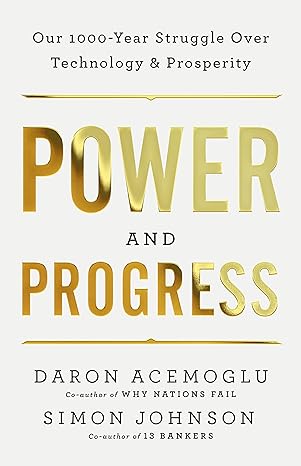Event Time:
4:00pm-5:30pm
Location:
Social Science Matrix, 820 Social Sciences Building, UC Berkeley
Date of Event:
October 10, 2023

Progress depends on the choices we make about technology. New ways of organizing production and communication can either serve the narrow interests of an elite or become the foundation for widespread prosperity.
Please join us as Simon Johnson, Ronald A. Kurtz (1954) Professor of Entrepreneurship, MIT Sloan School of Management, discusses his recent co-authored book Power and Progress: Our Thousand-Year Struggle Over Technology and Prosperity, based on a thousand years of history and contemporary evidence. Johnson will be joined in conversation with Brad DeLong, Professor of Economics, UC Berkeley.
Presented by the Berkeley Economy & Society Initiative (BESI). This will be a hybrid event (in-person and via Zoom). Registrants will receive a Zoom link on the day of the event.
About the Book

A thousand years of history and contemporary evidence make one thing clear. Progress depends on the choices we make about technology. New ways of organizing production and communication can either serve the narrow interests of an elite or become the foundation for widespread prosperity.
The wealth generated by technological improvements in agriculture during the European Middle Ages was captured by the nobility and used to build grand cathedrals while peasants remained on the edge of starvation. The first hundred years of industrialization in England delivered stagnant incomes for working people. And throughout the world today, digital technologies and artificial intelligence undermine jobs and democracy through excessive automation, massive data collection, and intrusive surveillance.
It doesn’t have to be this way. Power and Progress demonstrates that the path of technology was once—and may again be—brought under control. The tremendous computing advances of the last half century can become empowering and democratizing tools, but not if all major decisions remain in the hands of a few hubristic tech leaders.
With their breakthrough economic theory and manifesto for a better society, Acemoglu and Johnson provide the vision needed to reshape how we innovate and who really gains from technological advances.
About the Author
Simon Johnson is the Ronald A. Kurtz (1954) Professor of Entrepreneurship at the MIT Sloan School of Management, where he is head of the Global Economics and Management group. In 2007-08 he was chief economist at the International Monetary Fund, and he currently co-chairs the CFA Institute Systemic Risk Council. In February 2021, Johnson joined the board of directors of Fannie Mae.
Johnson’s most recent book, with Daron Acemoglu, Power and Progress: Our 1000-Year Struggle Over Technology and Prosperity, explores the history and economics of major technological transformations up to and including the latest developments in Artificial Intelligence.
His previous book, with Jonathan Gruber, Jump-Starting America: How Breakthrough Science Can Revive Economic Growth and the American Dream, explained how to create millions of good new jobs around the U.S., through renewed public investment in research and development. This proposal attracted bipartisan support.
Johnson was previously a senior fellow at the Peterson Institute for International Economics in Washington, D.C., a cofounder of BaselineScenario.com, a member of the Congressional Budget Office’s Panel of Economic Advisors, and a member of the Federal Deposit Insurance Corporation’s Systemic Resolution Advisory Committee. From July 2014 to early 2017, Johnson was a member of the Financial Research Advisory Committee of the U.S. Treasury’s Office of Financial Research (OFR), within which he chaired the Global Vulnerabilities Working Group.
“The Quiet Coup” received over a million views when it appeared in The Atlantic in early 2009. His book 13 Bankers: the Wall Street Takeover and the Next Financial Meltdown (with James Kwak), was an immediate bestseller and has become one of the mostly highly regarded books on the financial crisis. Their follow-up book on U.S. fiscal policy, White House Burning: The Founding Fathers, Our National Debt, and Why It Matters for You, won praise across the political spectrum. Johnson’s academic research papers on long-term economic development, corporate finance, political economy, and public health are widely cited.
“For his articulate and outspoken support for public policies to end too-big-to-fail”, Johnson was named a Main Street Hero by the Independent Community Bankers of America (ICBA) in 2013.

